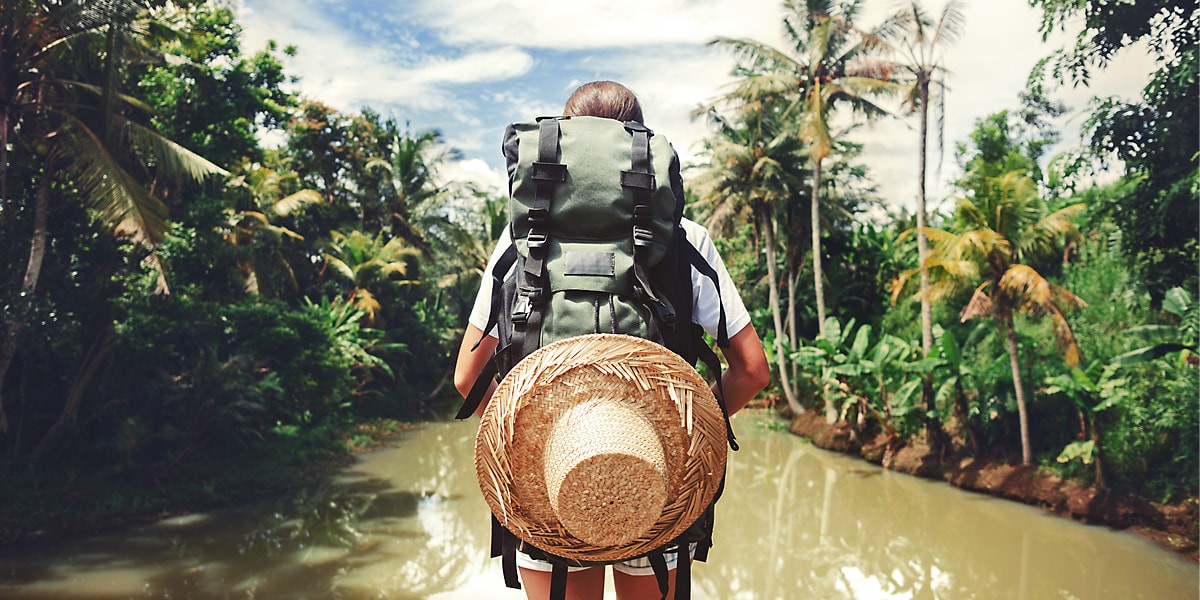About one in three Canadians will get shingles. But timely treatment can lessen symptoms, and a vaccine can help prevent it.
Travel tips for a healthy holiday
Getting ready for a winter vacation? Take some simple steps now to ensure you have a healthy, trouble-free holiday.

Maria Sklodowski enjoys travelling to far-flung places. She’s hiked in Nepal, Peru and China – and goes for weeks at a time. To date, she’s had no bad experiences, which she attributes to careful planning.
“When I went to Africa, I got vaccines for typhoid, yellow fever and hepatitis A and B 4 months before I left,” says the 77-year-old Toronto resident, who also brought mosquito netting. “And when I go south, I bring my medications with me. I buy health insurance. And I bring my international certificate of vaccinations with me.”
“You have to think ahead.”
“With so many moving parts and considerations, including health issues and comfort, taking steps to ensure proper preparation is essential,” says Lewis Smith, communications co-ordinator for the Canada Safety Council. He says health considerations need to be paramount, particularly if you’re travelling to an area that’s known to have insect-borne disease, such as malaria, dengue fever or Zika.
“We recommend seeing a doctor about necessary vaccinations a minimum of 6 weeks before travel,” says Smith, noting that with some vaccines, spacing of weeks or months is necessary between doses.
Think about your health needs
In addition to ensuring you’re properly vaccinated for your trip, there are other health considerations:
- Have a full supply of your prescription medications. Smith says your medicine kit should also include over-the-counter products such as anti-diarrheal medications, antibiotic creams for cuts and scrapes, eye solutions for contact lenses and anti-nausea medications for motion sickness. “Some countries have more stringent medication laws,” warns Smith. “Contact the nearest consulate – you may need to get a doctor’s written prescription to avoid any problems crossing the border.”
- Bring a first-aid kit. The last things you want to be looking for in a foreign country are first-aid items. That’s why the PHAC suggests you bring a first-aid kit that includes adhesive and non-adhesive bandages, hand sanitizer, an antiseptic cream, tweezers and scissors.
- Bring insect repellent. If the area you’re travelling to is known for mosquitos or ticks, bug spray or cream is critical. Or bring a mosquito net. “Spending all your vacation scratching insect bites and wishing you’d taken preventative steps doesn’t sound like much fun,” says Smith.
- Pack sun protection, whether that’s a hat, loose clothing or sunscreen. And ask your pharmacist whether your medications interact with the sun or make you more susceptible to sun stroke, says the Public Health Agency of Canada (PHAC). Don’t forget gels or creams to treat sunburn.
- Buy oral rehydration solutions. If you’re headed on a trip where gastrointestinal infections are common, the PHAC recommends you carry either packets of oral rehydration powder, which can be mixed with distilled water, or ready-mixed solution. Both forms are available at your local pharmacy.
- Purchase travel health insurance. Ensure you have health coverage for the full duration of your trip, the PHAC advises.
- Check travel advisories for the country you’re planning to visit. “Always keep an eye on these, both while you’re booking your trip and then again shortly before leaving,” says Smith. “Not only can this information be of use to you and your health, but it can also affect the coverage offered by your travel health insurance and trip cancellation insurance.”
Special considerations for seniors
Advance planning is even more important for seniors with mobility challenges and specific health needs. Smith suggests making arrangements for assistive devices such as wheelchairs, walkers or guide dogs, and calling ahead to airlines, tour organizers or hotels to ensure dietary requirements can be met.
You should also pack a list of medications, to assist physicians in foreign countries in the event of a medical emergency. And all medical devices – glucose monitors for diabetics, compression stockings, peak flow meters, etc. – should be safely packed.
Plus, health coverage needs to be secured. Even the young and healthy should have travel insurance in case of accident, but protection against unexpected healthcare costs is even more vital for seniors. “Ensure that your travel insurance is active and up-to-date before leaving, and keep contact information for your family or caregiver on your person at all times,” says Smith.


